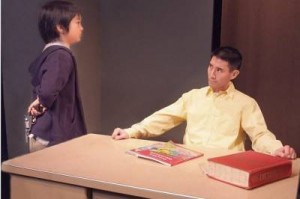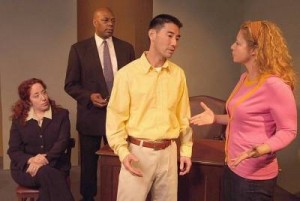
STUDENT BRINGS GUN TO SCHOOL; THREATENS TEACHER
An everyday occurrence in inner-city high schools, yet in Richard Martin Hirsch’s
The Monkey Jar, now in its world premiere engagement at Theatre 40,
Bienvenida Charter School is not in the inner city but rather in an upscale West
Los Angeles suburb, and the child involved is just 10 years old.
As in Roshomon, there is more than one version of what happened in Japanese-
American elementary school teacher Michael Dori’s classroom while Kai
Goldman (also Japanese-American, but adopted by a Jewish couple) was
being held over lunch period for remedial arithmetic. Michael claims that Kai
pointed the gun at him and threatened his life. Kai swears that he was only
showing his teacher the antique Civil War weapon in an attempt to win him
over (and besides, Kai says, he knew that his dad’s collector’s item had a missing
part and thus was incapable of shooting).
It is the specificity of Hirsch’s story, and the complexity of the characters involved
that make The Monkey Jar such a powerful piece of writing and, more than any
play in recent memory, the kind of story which provokes passionate discussion
both during intermission and post performance.
The dynamic Michael Dori is considered one of the best, if not the very best
teacher in his school, and we see him early on in charismatic action. Later,
though, we observe him publicly embarrass young Kai before his classmates
when Kai is incapable of multiplying six times eight. Michael, who is gay, lives in
constant fear that a parent may accuse him of “inappropriate” behavior.
Perhaps in an attempt to maintain a low profile, he keeps his personal life
private, though we learn that he and his Japanese-American partner have
been attempting to adopt a Japanese child for the past three years.
Kai’s parents are 30something professionals who had no difficulty in adopting Kai,
and Kai seems to have no problem with being raised Jewish (though, he’s happy
to say, they’re not making him attend Hebrew school) or by parents who look
nothing like him. Kai does have a slight learning disability, which explains his
troubles with times tables, but through a bureaucratic oversight, Michael has
not been informed of this.
Robert Rees, the brand new school principal, is African American in a
predominantly white school, and this move up and out of the Compton school
where he taught is both a promotion, and a challenge to him. Rees seems to be
starting out on a good foot, his charismatic presence winning over parents and
teachers alike, but should news of the “incident” be made public so soon after
his arrival, his future at Bienvenida could be in jeopardy.
Complicating matters is the ubiquitous Judith Heptner, powermom, PTA
President, and Chairperson of the Friends of Bienvenida Financial Committee, in
charge of fundraising for the school. Like a more sophisticated Gladys Kravitz
from Bewitched, Judith always seems to be passing by when something is amiss,
good news to a woman who relishes stirring up trouble.
The sole calming influence in the events surrounding “the incident” is Coral
Bryson, the specialist assigned to set up Kai’s IEP (Individual Education Program),
and through whose eyes we see the story unfold.
Numerous current school-related issues pop up in Hirsch’s intelligent and topical
script. Michael bemoans the loss of class time to “frivolous” field trips such as one
to the House of Blues, and isn’t terribly crazy about Rees’ stated intention to do
pop-in observations. As a charter school, Bienvenida Elementary requires above-
normal parental participation, with Judith exhorting PTA members to “shop till
we drop” at stores participating in their fund-raising scrip program.
Kai is an enigma, obviously smart, yet the simplest arithmetic seems to baffle
him. Basically a good kid, he still needs to be told again and again to abandon
his video games and study. “What is this? Auschwitz?” he asks cheekily.
So … is this an assault on a teacher by a potentially dangerous child, or simply a
“botched case of show and tell” by a youngster who just wanted his teacher to
like him? Only the two people in question know the truth, making The Monkey
Jar not a “who done it?” but a “what exactly did they do?” mystery, one which
only the play’s “wallop to the stomach” coda will solve.
Richard Horvitz and Salli Saffioti are very good indeed as Kai’s parents Aaron and
Nancy. Horvitz makes vivid Aaron’s volatile nature, his protectiveness of his
child, and the love which makes him Kai’s champion. Saffioti is the calming
influence in the couple, but sharp on her feet as well. When Judith asks for her
participation in the Easter (no make that Spring) Carnival, Nancy, recalling
Judith’s slight when Nancy helped with the Halloween Carnival, quickly makes
excuses. “But I haven’t said which weekend the Carnival will be on,” protests
Judith. “No matter,” says Nancy. “I need to keep the entire season open.” With
parents like these, Kai’s defense would seem to be in good hands.
Mark Berry does excellent work as Principal Rees, a man with the ingratiating
people skills to be a politician, relieved to at last find himself in a safe educational
environment, yet frustrated by a community which “want private school results
at public school prices” and feeling pressure from parents, “half of whom are
attorneys.”
Addie Daddio, who joined the cast of The Monkey Jar only a week or so before
opening night, gives an absolutely sensational performance as meddling, go-
getting ubermom Judith, a woman who seems to think she’s the best thing since
sliced bread, yet doesn’t get it when an inadvertent joke provokes laughter. It’s
never too soon to start thinking about middle schools, she tells the Goldmans,
though one wonders if she isn’t already planning her 10-year-old’s college career.
In the double-cast role of Kai, Sekai Murashige proves himself a promising young
actor.
Finally, there is Amy Tolsky doing her usual fine work as Coral. Tolsky, who excels in
portraying larger than life characters, is a perfect choice for the
observer/narrator of the tale. In the hands of a blander actress, Coral might
disappear among the other characters. Tolsky holds our attention because she
is Amy Tolsky, and that is good news for the character, and for the production.
Director Warren Davis has not only elicited memorable performances from his
seven actors, but deserves special credit for the swift pace of the production.
Scene changes are many, but accomplished speedily with the aid of his carefully
choreographed cast, who deserve double credit for moving furniture and props.
Jeff G. Rack’s set, Meghan Hong’s lighting, and Jonathan Snipes’ music
(excellent all three) also contribute to fast scene changes, without which the
production could easily have bogged down. Holly Victoria’s costumes and the
characters Hirsch has created are a perfect fit.
Only one brief scene in the play could stand some reworking. At one point, lights
come up on Michael and Judith, both on their cell phones. The logical
assumption is that the two are having a conversation, and it was only after
valuable information had been lost, as both I and my guest kept trying to figure
out what the two were discussing, that we realized that the two conversations
were unrelated. Perhaps if lights went up on Michael’s conversation, and then
slightly later Nancy’s phone were to ring and her own conversation start,
confusion might be avoided.
Other than this, The Monkey Jar proves once more what a gifted (and versatile)
playwright Richard Martin Hirsch is. Nothing at all like his previous The Quality of
Life and Atonement, yet equally outstanding, The Monkey Jar is likely to be one
of the most discussed shows of the new year, and marks an auspicious beginning
of 2008 for Theatre 40.
–Steven Stanley
February 2, 2008
Photo: Ed Krieger




 Since 2007, Steven Stanley's StageSceneLA.com has spotlighted the best in Southern California theater via reviews, interviews, and its annual StageSceneLA Scenies.
Since 2007, Steven Stanley's StageSceneLA.com has spotlighted the best in Southern California theater via reviews, interviews, and its annual StageSceneLA Scenies.







 COPYRIGHT 2024 STEVEN STANLEY :: DESIGN BY
COPYRIGHT 2024 STEVEN STANLEY :: DESIGN BY